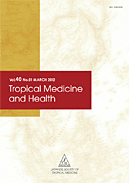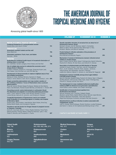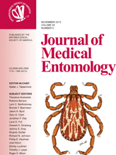
ACTA TROPICA
Scope & Guideline
Championing Research in Parasitology and Veterinary Sciences
Introduction
Aims and Scopes
- Epidemiology and Control of Vector-Borne Diseases:
Research related to the epidemiology, ecology, and control strategies for vector-borne diseases such as malaria, dengue, leishmaniasis, and schistosomiasis. - Molecular and Genetic Studies:
Studies focusing on the molecular and genetic characterization of parasites, vectors, and hosts, including investigations into drug resistance and vaccine development. - Ecological and Environmental Influences:
Research examining the impact of environmental changes, climate, and habitat modifications on disease transmission dynamics and vector populations. - Public Health Implications and Interventions:
Research addressing public health strategies, community engagement, and the socio-economic factors influencing the control of tropical diseases. - Innovative Diagnostic and Treatment Approaches:
Development and evaluation of novel diagnostic tools and therapeutic strategies for the effective management of tropical diseases.
Trending and Emerging
- Climate Change and Disease Dynamics:
Recent studies increasingly focus on the impact of climate change on the distribution and transmission dynamics of tropical diseases, highlighting the need for adaptive public health strategies. - Zoonotic Diseases and One Health Approach:
There is a growing emphasis on zoonotic diseases, integrating wildlife, environmental, and human health perspectives under the One Health framework, reflecting the interconnectedness of health systems. - Vector Control Innovations:
Research into innovative vector control strategies, including the use of genetically modified organisms and novel biocontrol agents, is on the rise as traditional methods face challenges. - Molecular Epidemiology and Genomics:
Emerging themes include the application of genomic technologies for tracking pathogen evolution and understanding resistance mechanisms, which are becoming critical in managing tropical diseases. - Social Determinants of Health:
Increasing attention is being paid to the social determinants of health, exploring how economic, educational, and environmental factors influence the spread and control of tropical diseases.
Declining or Waning
- Historical Epidemiological Studies:
There has been a noticeable decrease in the publication of papers focusing on historical epidemiological studies, as the field shifts towards contemporary analyses and real-time data. - Traditional Herbal Remedies:
Research on traditional herbal remedies for tropical diseases appears to be waning, likely due to a growing emphasis on scientifically validated treatments and synthetic pharmaceuticals. - Single-Pathogen Studies:
The trend is moving away from studies focusing solely on single pathogens, as the complexity of co-infections and their interactions within hosts are gaining more attention.
Similar Journals

Tropical Medicine and Health
Transforming research into real-world health solutions.Tropical Medicine and Health is a prestigious open-access journal published by BMC that serves as a vital platform for researchers and health professionals focusing on the fields of tropical medicine, infectious diseases, and public health. With an ISSN of 1348-8945 and an E-ISSN of 1349-4147, the journal has established itself in the academic community since its inception in 2004, bridging the gap between research and real-world applications in managing tropical diseases. Recognized for its quality, it holds a commendable Q2 ranking in both the Infectious Diseases and Public Health, Environmental and Occupational Health categories, positioned in the 2023 Scopus rankings within the 85th and 74th percentiles, respectively. Researchers can access high-quality, peer-reviewed articles that contribute significantly to advancing knowledge in the field. With a commitment to fostering open scientific dialogue, Tropical Medicine and Health is not just a journal, but a collaborative space for researchers, students, and practitioners working to improve health outcomes in tropical regions worldwide.

Research and Reports in Tropical Medicine
Transforming research into impactful health strategies.Research and Reports in Tropical Medicine is a distinguished open-access journal dedicated to advancing knowledge in the field of tropical medicine. Published by DOVE MEDICAL PRESS LTD, this journal operates under the ISSN 1179-7282, facilitating global access to quality research since its inception in 2010. With a commitment to disseminating innovative findings and critical analyses, the journal serves as a vital platform for researchers, professionals, and students engaged in the diverse aspects of tropical diseases and public health challenges. Research and Reports in Tropical Medicine welcomes original research articles, reviews, and case studies that contribute to an improved understanding of health issues in tropical regions, making it an essential resource for those aiming to impact global health positively.

TROPICAL BIOMEDICINE
Fostering excellence in tropical biomedical research.Tropical Biomedicine, published by the Malaysian Society of Parasitology and Tropical Medicine, is an influential journal dedicated to the field of infectious diseases and parasitology. Since its inception in 2005, the journal has aimed to advance scientific knowledge and foster research in tropical health, providing a vital platform for disseminating high-quality research findings, case studies, and reviews. With a Q3 ranking in Infectious Diseases and a Q4 in Parasitology for 2023, the journal plays an essential role in addressing the challenges faced in these fields, particularly in tropical and subtropical regions. Although currently not open access, its contributions are pivotal for researchers, healthcare professionals, and students dedicated to combating diseases prevalent in diverse ecological environments. By focusing on relevant topics and innovative approaches, Tropical Biomedicine seeks to enlighten and inspire the ongoing fight against tropical diseases, ultimately improving public health outcomes.

AMERICAN JOURNAL OF TROPICAL MEDICINE AND HYGIENE
Exploring the frontiers of tropical medicine since 1945.The American Journal of Tropical Medicine and Hygiene, published by the American Society of Tropical Medicine & Hygiene, serves as a pivotal platform for the dissemination of innovative research and clinical findings in the realm of tropical medicine and health. With an illustrious history dating back to 1945, this journal has maintained its commitment to enhancing global health, particularly in the fields of Infectious Diseases, Parasitology, and Virology. It currently boasts an impressive impact factor and ranks in the Q1 category for Parasitology and Q2 for Infectious Diseases and Medicine (miscellaneous), highlighting its academic prominence. The journal's mission is to advance research, showcase cutting-edge studies, and foster collaboration among researchers, healthcare professionals, and students dedicated to tackling tropical diseases and improving public health worldwide. While access is not open, the journal remains a critical resource for anyone looking to stay informed on the latest advancements in the field.

KOREAN JOURNAL OF PARASITOLOGY
Exploring the Frontiers of Parasitic ResearchKorean Journal of Parasitology is a respected publication in the field of parasitology, originating from the esteemed Korean Society of Parasitology and affiliated with Seoul National University College of Medicine. Established in 1977, this journal focuses on disseminating significant research findings related to parasitic diseases, their vectors, and control measures, serving as a vital resource for researchers, medical professionals, and students alike. Although coverage in Scopus has been discontinued as of 2022, the journal remains a valuable platform for in-depth studies within the areas of Infectious Diseases and Immunology. With an ISSN of 0023-4001 and an E-ISSN of 1738-0006, the journal promotes open access to enhance academic sharing. Despite its current Scopus rankings, which place it in the 38th percentile for Infectious Diseases and 37th percentile for Immunology and Microbiology (Parasitology), it continues to contribute to the global discourse on parasitological research, encouraging collaboration and emphasizing the importance of this field in public health.

Journal of Infection in Developing Countries
Innovating public health strategies for a brighter future.Journal of Infection in Developing Countries, published by J INFECTION DEVELOPING COUNTRIES, is a premier open-access journal dedicated to advancing research in the fields of infectious diseases, microbiology, parasitology, and virology, particularly within the context of developing nations. Established in 2007 and actively disseminating knowledge since 2008, this journal aims to bridge the gap between researchers and practitioners by providing a platform for high-quality, peer-reviewed articles that address the unique challenges faced in these regions. With an ISSN of 1972-2680 and a robust HIndex showcasing its growing influence, JIDC has attained a Q3 category ranking in several disciplines as of 2023, indicating its crucial role in shaping ongoing discourse in public health. As an open-access publication, it ensures that vital research is accessible to all, fostering collaboration and innovation in infectious disease management and control.

Current Tropical Medicine Reports
Innovating solutions for global health challenges.Current Tropical Medicine Reports, published by Springer, is an esteemed journal that serves as a pivotal platform for researchers, professionals, and students in the fields of immunology, allergy, and infectious diseases. With a strong focus on emerging tropical medicine topics, the journal provides an authoritative avenue for disseminating innovative research and practical insights, showcasing its commitment to advancing global health knowledge. Now in its convergence years from 2014 to 2024, it has successfully established itself in the academic community, evidenced by its Q2 rankings in the categories of Infectious Diseases and Immunology and Allergy in 2023, reflecting its impact and relevance. The journal boasts impressive Scopus rankings, holding the 50th position in Infectious Diseases and 55th in Immunology and Allergy, further underscoring its significance in these critical fields. While it operates under a subscription model, the journal serves not only as a resource for published research but also as a catalyst for collaboration and knowledge exchange among the scientific community. With a growing readership, Current Tropical Medicine Reports is poised to continue shaping the discourse surrounding tropical health challenges.

Parasite
Championing accessible research in agricultural and biological sciences.Parasite is a distinguished open-access journal published by EDP Sciences S A based in France, specializing in the multifaceted field of parasitology and related disciplines. Since its inception in 1994, it has played a pivotal role in advancing research in Agricultural and Biological Sciences, Animal Science and Zoology, Infectious Diseases, Insect Science, and Veterinary Sciences, earning a prominent place in the academic community with its 2023 rankings placing it in the Q1 category for several key areas. With an impact factor reflective of its quality and engagement, the journal fosters a collaborative environment for researchers, professionals, and students to disseminate and access high-quality studies and reviews. Operating under an open-access policy since 2013, Parasite ensures that cutting-edge research is accessible to a global audience, thereby promoting knowledge sharing and innovation in the field. For more information, please visit the journal's homepage and explore its extensive repository of articles that contribute to the understanding of parasitic interactions and their implications in health and agriculture.

JOURNAL OF MEDICAL ENTOMOLOGY
Unveiling the science behind insects and their health implications.JOURNAL OF MEDICAL ENTOMOLOGY, published by Oxford University Press, is a prestigious journal dedicated to advancing the field of medical entomology, a critical area of study that explores the intersection of insect biology and public health. With an ISSN of 0022-2585 and an E-ISSN of 1938-2928, the journal features high-quality research articles and reviews that delve into the impacts of insect vectors on infectious diseases and parasitology, making it an essential resource for professionals and researchers alike. The journal has garnered significant recognition in the academic community, currently ranking in the top quartiles: Q2 in Infectious Diseases, Q1 in Insect Science, Q2 in Parasitology, and Q1 in Veterinary (miscellaneous), reflecting its influential contributions to these disciplines. With its comprehensive coverage of topics spanning across medical entomology and veterinary sciences, authors and readers will find a platform rich in valuable insights and data. The journal's long-standing history, dating back to its inception in 1964, ensures a legacy of excellence that continues through 2024 and beyond. While it does not currently offer open access, researchers are highly encouraged to engage with its content to foster a deeper understanding of the crucial role that insects play in human and animal health.

Current Research in Parasitology & Vector-Borne Diseases
Fostering interdisciplinary dialogue in parasitology research.Current Research in Parasitology & Vector-Borne Diseases, published by ELSEVIER, is an influential journal dedicated to advancing the understanding of parasitology and vector-borne diseases. With an ISSN of 2667-114X, this journal is highly esteemed in the field, holding a prestigious Q1 quartile ranking in categories such as Animal Science and Zoology, Insect Science, and Parasitology, as well as a notable Q2 ranking in Virology for 2023. The journal's focus spans a crucial intersection of disciplines, offering a platform for innovative research that directly addresses global health challenges posed by parasites and vectors. Researchers benefit from its robust open-access model, which facilitates unrestricted dissemination of knowledge, making essential findings accessible to a wider audience. The journal continues to play a pivotal role in fostering scholarly dialogue and interdisciplinary collaboration within the scientific community, serving as a vital resource for professionals, students, and academicians interested in the dynamic and evolving field of parasitology.